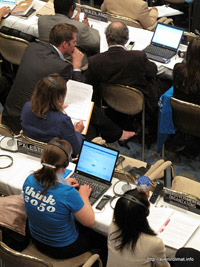Gareth Sweeney, chief editor of TI’s Global Corruption Report, talks about what to expect from the upcoming climate talks in Bonn and where the discussion needs to go
The Global Corruption Report: Climate Change positions access to information and direct public participation in the UN Framework Convention on Climate Change (UNFCCC) processes as essential elements in strengthening the legitimacy and effectiveness of climate governance.
It also stresses the advantages of looking outside the traditional environmental sphere, such as to the UN Human Rights Council (HRC), for examples of good civil society participation (see Article 3.4). These recommendations are also consolidated in Transparency International’s new policy position on public participation. As someone who worked to make the HRC more open to civil society, I am starting to appreciate what measures were in place as I see other institutions that are less open.
However, from the latest evidence the UNFCCC has yet to look far afield for ideas to improve participation.
The UNFCCC’s Subsidiary Body for Implementation (SBI) – the intergovernmental body responsible for measuring states’ implementation of the Convention – will meet in Bonn on 8 June 2011 to discuss ways to ‘to enhance the engagement of observer organizations’. It is hoped that the outcomes will feed into a decision at the next UNFCCC Conference of the Parties (COP) in Durban in December 20011 to formally strengthen the system for stakeholder engagement.
On 13 May, the UNFCCC secretariat circulated an advance background document to facilitate the discussion in Bonn. Based on submissions by all stakeholders, it is presented as a summary of ‘good practices relating to observer organizations in the United Nations system’ (para. 43-49). In truth, however it is a review of average-to-good practice in the UN environmental system only. The scope is unnecessarily limited to standards such as the Aarhus Convention, Convention on Biological Diversity, the United Nations Convention to Combat Desertification, the European Environment and Health Committee and the United Nations Forum on Forests (UNFF) as points of reference.
They could have drawn on a wealth of easily implementable recommendations from the Human Rights Council on direct participation. These include: written submissions, use of extranet portals for draft resolutions and country statements, webcast archiving by speaker and so forth. In the end, the only reference afforded to the Human Rights Council in the summary report is that it ‘provides a text message service to inform participants registered for the service of forthcoming agenda items’ (para. 45).
This falls considerably short of reflecting what’s out there. It is also a lost opportunity to draw relevant processes such as climate change and human rights closer together.
This can be redeemed of course on 8 June, and Transparency International will participate in the open SBI meeting on effective stakeholder engagement to carry the message forward.
We will also carry the message to Vienna, where the Implementation Review Group that oversees the review mechanism of the UN anti-corruption convention will hold a session from which civil society groups are blocked, something TI and the UNCAC coalition want to change at the Conference of States Parties in October 2011.

















 Connect with us on Facebook
Connect with us on Facebook Follow us on Twitter
Follow us on Twitter